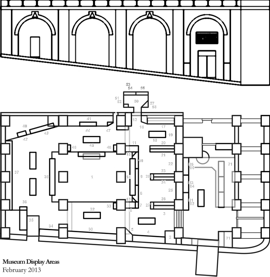Category:London Road Viaduct
2014: London Road Viaduct, aerial view showing the viaduct curve [image info]
2015: Train crossing London Road Viaduct [image info]
View through the pierced arches of London Road Viaduct, showing the structure's curve. Photo taken by a museum volunteer. [image info]
Brighton Viaduct (officially London Road Viaduct) is an imposing set of high Victorian brickwork arches carrying the railway lines Eastward. Construction started in 1845. It was designed by John Urpeth Rastrick.
Rastrick also designed the Ouse Valley Viaduct as part of the same project, and the two viaducts are essentially siblings. The two viaducts share the same distinctive arching, pierced piers and balustrades, the main difference being that where the Ouse Viaduct is ruler-straight (as can be seen from photographs taken through the central "windows" in each arch), the twenty-seven arches that make up the London Road viaduct form a comparatively tight curve. Both viaducts are Grade-II listed buildings.
Geography
Although most of the arches forming the viaduct are semicircular, the arch spanning Preston Road is significantly wider to take in the road's width, and its span has a more complex, "stretched" curve.
Although the Viaduct was originally built on essentially open land, and early drawings of it show it crossing a road surrounded by empty fields, the region below it quickly filled with houses as the new station brought in visitors and boosted the local economy. As a result, a structure that was originally one of Brighton's most impressive landmarks is now difficult to see from most locations. The best views are from almost underneath the viaduct, just North of Preston Circus and the Duke of York's Picturehouse, past the head of London Road.
Local knowledge
The Brighton-born boxer Tom Sayers (1826-1865), joint Champion of the first world boxing championship match (which concluded in a draw) worked on the viaduct's construction as a labourer.


Media in category ‘London Road Viaduct’
The following 5 files are in this category, out of 5 total.
- London Road Viaduct (Brighton 2014).jpg 3,000 × 1,684; 4.07 MB
- London Road Viaduct, Brighton, WW2, bombed (BRIPAW 1944).jpg 1,200 × 842; 322 KB
- London Road Viaduct, Brighton.jpg 640 × 853; 205 KB
- London Road Viaduct, WW2, bombed, scaffolding (BRIPAW 1944).jpg 1,200 × 838; 375 KB
- Train on London Road Viaduct (Brighton 2015).jpg 1,600 × 915; 898 KB










